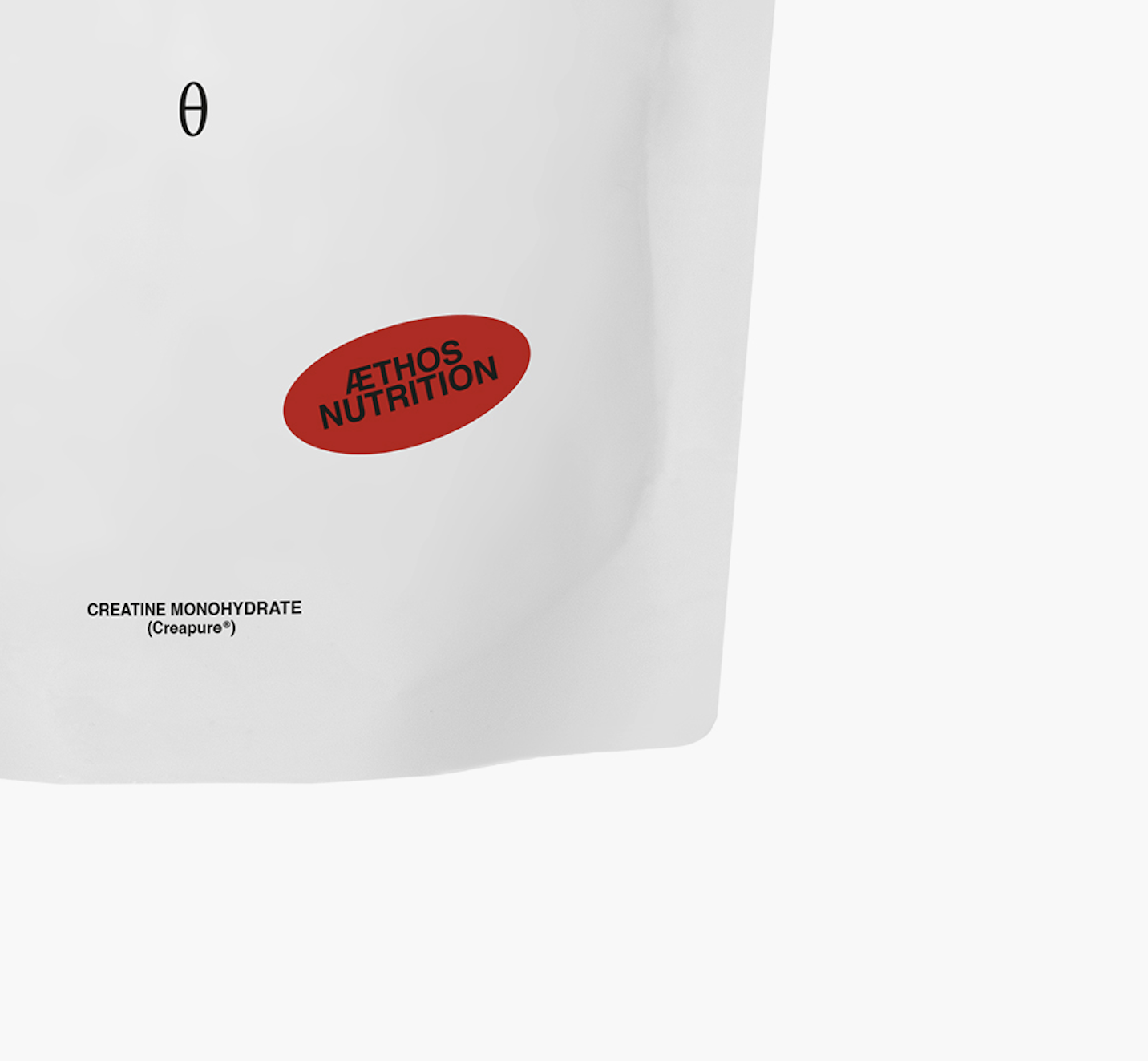
CREATINE
MONOHYDRATE
OUR WHYCreatine enhances reaction time under sleep loss, speeds up concussion recovery, improves blood sugar with HIIT, and strengthens aging muscle and bone.
Beyond Muscle: Brain, Metabolism & Healthy Ageing
Creatine boosts muscle protein synthesis, sustains peak power in sprints, and reduces fatigue for harder training and faster recovery.
Creatine & Exercise, a Match Made in Physiology Heaven
creatine, the science of sustained power.
Over 25 years of research. Thousands of studies. One clear message: creatine works. Not hype, but hard evidence: reproducible, reliable, and relevant to your goals. Whether you’re training for strength, sprint performance, brain resilience, or longevity, creatine monohydrate remains the gold standard. And we use the best there is—Creapure®.
-
Creatine monohydrate acts like a rechargeable battery for your body’s explosive movements. It increases stores of phosphocreatine (PCr) in muscles and brain tissue—allowing faster, stronger, and more sustained performance.
Bump your PCr stores by 20–40% and you unlock:Heavier lifts, sharper jumps, faster sprints
More volume across training sets
Quicker recovery between efforts and sessions
-
Creatine shines when paired with movement:
Resistance training: boosts muscle protein synthesis
Sprints & HIIT: recharges ATP faster = more power, longer
Recovery: less fatigue = more consistent training
-
Creatine’s benefits go far beyond the gym:
Cognitive resilience: maintains reaction time after sleep loss
TBI recovery: quicker post-concussion markers in athletes
Blood sugar control: reduces HbA1c when combined with HIIT
Healthy ageing: improves muscle strength & bone density in older adults

Our creatine monohydrate is more than just effective, it’s scientifically proven. From boosting strength to supporting brain health, every benefit is backed by cutting-edge research. But don't just take our word for it, see the evidence for yourself in the foundational studies below.
Evidence-Based Excellence.
-
Common questions and misconceptions about creatine supplementation: What does the scientific evidence really show?
Antonio, J., Candow, D. G., Forbes, S. C., et al. (2021). Journal of the International Society of Sports Nutrition, 18(1), 13.Part II—Common questions and misconceptions about creatine supplementation: 2024 update.
Antonio, J., Candow, D. G., Forbes, S. C., et al. (2024). Journal of the International Society of Sports Nutrition, 22(1).ISSN position stand: Safety & efficacy of creatine supplementation in exercise, sport and medicine.
Kreider, R. B., Kalman, D. S., Antonio, J., et al. (2017). JISSN, 14, 18.ISSN position stand: Creatine supplementation & exercise.
Buford, T. W., Kreider, R. B., Stout, J. R., et al. (2007). JISSN, 4, 6.Creatine in health and disease: Evidence from randomized controlled trials.
Ostojic, S. M. (2021). Nutrients, 13(2), 447.Creatine supplementation is safe and beneficial throughout the lifespan and should not be restricted.
Kreider, R. B., Jagim, A. R., Antonio, J., et al. (2025). Frontiers in Nutrition, 12, 1578564.Clinical pharmacology of the dietary supplement creatine monohydrate. Persky, A. M., & Brazeau, G. A. (2001). Pharmacological Reviews, 53(2), 161-176.
Muscle creatine loading in men.
Hultman, E., Söderlund, K., Timmons, J. A., et al. (1996). Journal of Applied Physiology, 81(1), 232-237.Effects of creatine monohydrate timing on resistance-training adaptations after 8 weeks in collegiate athletes.
Dinan, N. E., Hagele, A. M., Jagim, A. R., et al. (2022). Frontiers in Sports & Active Living, 4, 1033842.Effect of creatine supplementation and sleep deprivation on cognition, mood and hormones.
McMorris, T., Harris, R. C., Swain, J., et al. (2006). Psychopharmacology, 185(1), 93-103.Creatine in type 2 diabetes: A randomized, double-blind, placebo-controlled trial.
Gualano, B., de Salles Painelli, V., Roschel, H., et al. (2011). Medicine & Science in Sports & Exercise, 43(5), 770-778.Creatine supplementation does not impair kidney function in type 2 diabetic patients.
Gualano, B., Roschel, H., de Salles Painelli, V., et al. (2011). European Journal of Applied Physiology, 111(5), 749-756.Creatine supplementation with specific view to exercise/sports performance.
Cooper, R., Naclerio, F., Allgrove, J., & Jimenez, A. (2012). JISSN, 9, 33.Creatine for exercise and sports performance, with recovery considerations for healthy populations.
Wax, B., Kerksick, C. M., Jagim, A. R., et al. (2021). Nutrients, 13(6), 1915.Creatine in humans with special reference to supplementation.
Balsom, P. D., Söderlund, K., & Ekblom, B. (1994). Sports Medicine, 18(4), 268-280.Creatine supplementation and exercise performance: Recent findings.
Bemben, M. G., & Lamont, H. S. (2005). Sports Medicine, 35(2), 107-125.Creatine supplementation during resistance training in older adults: A meta-analysis.
Devries, M. C., Phillips, S. M. (2014). Medicine & Science in Sports & Exercise, 46(6), 1194-1203.Use of creatine in the elderly and evidence for effects on cognitive function.
Rawson, E. S., & Venezia, A. C. (2011). Amino Acids, 40(5), 1349-1362.Effects of creatine supplementation on brain function and health.
Dolan, E., Gualano, B., Rawson, E. S., et al. (2022). Nutrients, 14(5), 921.Acute renal failure in a young weight-lifter taking multiple supplements including creatine.
Thorsteinsdottir, B., Grande, J. P., & Garovic, V. D. (2006). Journal of Renal Nutrition, 16(4), 341-345.
GET YOUR creatine monohydrate NOW
300g - 60 servings
€ 29.90
Frequently Asked Questions
-
Only if you're in a hurry. Loading (2 × 5g servings every day for 4 weeks) saturates your system faster. Otherwise, one daily serving of 5g will get you there over time.
-
Muscles absorb creatine fast, but the brain needs a higher dose to see effects. Studies show ~0.1 g/kg/day (about 10 g daily) for 30 days helps boost cognitive performance, especially under stress or sleep deprivation.
-
Technically yes, but practically no. You’d need to eat a kilo of red meat or half a kilo of oily fish daily to match one serving of creatine powder, along with all the added calories and saturated fat that come with it.
-
Creatine amplifies results from resistance training, sprint work, and high-intensity intervals. It helps you recover quicker, push harder, and progress faster.
-
Yes. Over 1,000 studies, including trials using 30g/day for 5 years, confirm it’s safe for healthy individuals. The only consistent side-effect is a small water weight gain (1–2 kg) in your muscles, which is a performance advantage. Concerns about kidney damage, dehydration, or hair loss are myths.
-
Purity, safety, and trust. Creapure® is third-party tested, ≥99.9% pure, free from banned substances, and produced to pharmaceutical-grade standards. The majority of creatine on the market is sourced from China, ours comes directly from a trusted source in Germany. When performance matters, quality isn’t optional.




